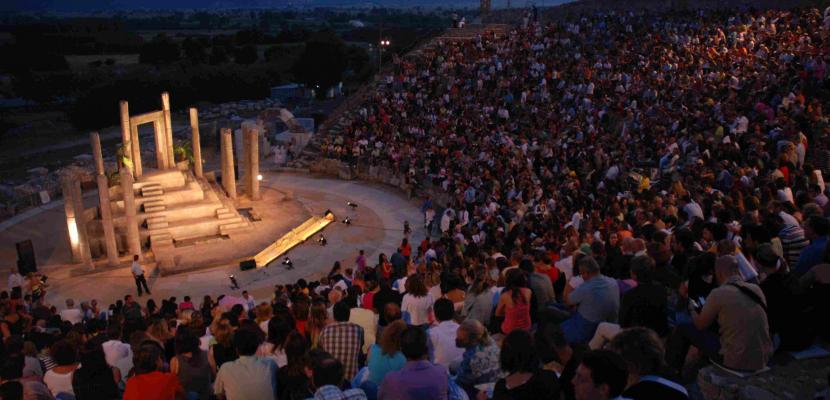Image

Rehabilitation of the ancient city of Philippi
Published on 22 September 2021

Greece
Anatoliki Makedonia, Thraki
This is the good practice's implementation level. It can be national, regional or local.
About this good practice
The ancient city of Philippi(UNESCO site), is a precious part of the ancient history of Greece. Yearly it attracts on average 50,000visitors, without counting the visitors to St.Lydia Baptistery, the spectators in the ancient Theatre and the visitors to monuments out of the ticketed city-part.
The cost of the continues excavation/research, the maintenance, weeding, rehabilitation of certain parts, etc. is considerable, requiring highly skilled scientists and workers and sufficient funding.
The challenge was to have the place visitable, promoted within its carrying capacity and part of the annual expenditure to be covered by the respective income of activities.
The prioritization of the parts that are rehabilitated in connection with the set of entrance tickets (at least for the main part of the ancient city), the use of the ancient theatre for ancient Greek plays and concerts with entrance ticket, the sales of the official–certified replicas of ancient items, are positive feasibility measures for the place.
The use of the theatre is a good practice as it allows income generation and the local authority also provides assistance to cover some of the needs of the place.
The practice is implemented in cooperation of the Ephorate of Antiquities and the Municipality of Kavala (Philippi). Other main stakeholders are the Regional Authority, the Aristotle University of Thessaloniki, the French Archaeological School, the Ministry of Tourism, the Church, Cultural Associations, etc.
The cost of the continues excavation/research, the maintenance, weeding, rehabilitation of certain parts, etc. is considerable, requiring highly skilled scientists and workers and sufficient funding.
The challenge was to have the place visitable, promoted within its carrying capacity and part of the annual expenditure to be covered by the respective income of activities.
The prioritization of the parts that are rehabilitated in connection with the set of entrance tickets (at least for the main part of the ancient city), the use of the ancient theatre for ancient Greek plays and concerts with entrance ticket, the sales of the official–certified replicas of ancient items, are positive feasibility measures for the place.
The use of the theatre is a good practice as it allows income generation and the local authority also provides assistance to cover some of the needs of the place.
The practice is implemented in cooperation of the Ephorate of Antiquities and the Municipality of Kavala (Philippi). Other main stakeholders are the Regional Authority, the Aristotle University of Thessaloniki, the French Archaeological School, the Ministry of Tourism, the Church, Cultural Associations, etc.
Resources needed
The total amount is estimated in tens of millions, over the last decades. Usually each intervention specific project in the place, is through a funded programme and could benefit 2-5 million EURO.
Human Resources are provided by the Ministry of Culture and the Theatre Municipal Enterprise.
Human Resources are provided by the Ministry of Culture and the Theatre Municipal Enterprise.
Evidence of success
The practice is successful as it covers part of the expenditures by generated income, it has social impact and affects positively the cultural heritage. The place is unique and has scientific, aesthetic, cultural and educational values. The model of cooperation of the Ephorate of Antiquities with the Local Authority is transferable and affects the related policies positively.
The inscription in UNESCO calatogue allowed creation of tools (Management plan, Risk management, etc.)
The inscription in UNESCO calatogue allowed creation of tools (Management plan, Risk management, etc.)
Potential for learning or transfer
The practice is an interesting approach as it brings together entities that in many cases consider their interests as contradicted.
The cooperation of the Ephorate of Antiquities and the Local Authorities in many tasks, including the 10years extended procedure to prepare the dossier for the inscription in the UNESCO catalogue as part of the World Cultural Heritage, and achieve that goal, is a good lesson, that although different opinions may exist, there’s always space for convergence. In this case, the cooperation and the convergence pre-existed as the locals had realised the potential of the site, while they were seeing Greek and foreign scientists working in the excavations.
There are significant steps further, however, the case could be a paradigm for cooperation of different entities and also for sustainable exploitation of the cultural assets.
The model is considered transferable. Such attempts to transfer the approach, are now in consideration in other areas as well.
The cooperation of the Ephorate of Antiquities and the Local Authorities in many tasks, including the 10years extended procedure to prepare the dossier for the inscription in the UNESCO catalogue as part of the World Cultural Heritage, and achieve that goal, is a good lesson, that although different opinions may exist, there’s always space for convergence. In this case, the cooperation and the convergence pre-existed as the locals had realised the potential of the site, while they were seeing Greek and foreign scientists working in the excavations.
There are significant steps further, however, the case could be a paradigm for cooperation of different entities and also for sustainable exploitation of the cultural assets.
The model is considered transferable. Such attempts to transfer the approach, are now in consideration in other areas as well.
Further information
Website
Good practice owner
Organisation
Ministry of Culture, Education and Religion

Greece
Anatoliki Makedonia, Thraki
Contact
EU Projects Expert